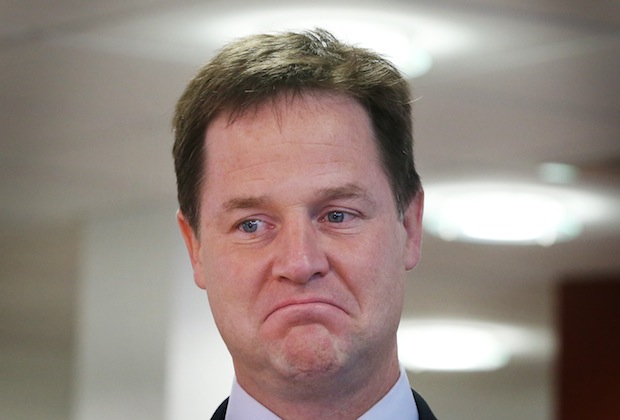It’s tempting to see Nick Clegg as a champion of lower taxes. He’s nudged the tax threshold up over this parliament and in a letter sent out to Liberal Democrat members (while David Cameron is out of the country) he suggests the state should only start to confiscate earnings from people when they hit £10,500 a year, higher than his current target of £10,000, from April 2015. He has this to say:
Think of it as a workers’ bonus. The British people have lived with austerity for three years. Your sacrifices are making it possible for us to fix the economy*. This is your recovery and you deserve to feel the benefits – without delay.”
While I applaud his focus on those on low incomes, this is a rather weak solution. The problem with raising the tax threshold is that, as a policy, it occupies the space where a proper tax for the low-paid cut should be. Raising the tax threshold gives politicians good applause lines in speeches (“We have cut taxes for 24 million people!”) but they don’t add the next bit “…by about £1.70 a week, and the impact of that will be eroded by the inflation we tolerate”.
The Swedish conservatives did this properly: they used Earned Income Tax Credit to direct a big tax cut to the low-paid- so they were better-off to the tune of one month’s extra salary a year. That’s a nice, solid and memorable fact which Anders Borg, Sweden’s genius finance minister, was able to use on election day – winning his party its first-ever re-election. Studies later found that so many in Sweden were encouraged to work, and leave welfare, that the tax cut almost entirely paid for itself. As far as I’m aware, George Osborne rejects the concept of self-financing tax cuts.
The brutal fact is that the low-paid are having a pretty miserable recovery, with earning power not expect to recover to 2008 levels until at least 2018. Raising the tax threshold to £10,500, while welcome, would not give them the “workers bonus” so badly needed. It’s to Clegg’s credit that he is making noises about this subject – and, frankly, I wish the Tories would be noisier about this. But an emergency tax cut, to the tune of one extra month’s salary a year, is closer to what’s needed.
* The below graph shows how far the UK economy is being fixed compared to others (including Sweden)
 UPDATE: Nick Clegg also says in his letter that he hopes to “persuade” the Conservatives to back the plan “if we can find the money in a responsible way”. One way of doing this stands out. Clegg stopped George Osborne from lowering the top rate of income tax from 50p to 40p, and kept it at 45p. But even this smallish tax cut has led to a higher amount of tax coming from the highest-paid (as economists would expect). Today’s Sunday Times reminds us that the top 1pc now pay 29.8pc of all income tax collected (see graph, below).
UPDATE: Nick Clegg also says in his letter that he hopes to “persuade” the Conservatives to back the plan “if we can find the money in a responsible way”. One way of doing this stands out. Clegg stopped George Osborne from lowering the top rate of income tax from 50p to 40p, and kept it at 45p. But even this smallish tax cut has led to a higher amount of tax coming from the highest-paid (as economists would expect). Today’s Sunday Times reminds us that the top 1pc now pay 29.8pc of all income tax collected (see graph, below).
 The good news is that there is potential to squeeze even more from the rich. Research from the CEBR suggests the optimum tax rate – i.e., that which would draw most money for the Exchequer – is 38 per cent. So if the coalition would reduce the top rate closer to 38p (it’s 47p now, when you include National Insurance) it would raise the extra cash which Clegg talks about.
The good news is that there is potential to squeeze even more from the rich. Research from the CEBR suggests the optimum tax rate – i.e., that which would draw most money for the Exchequer – is 38 per cent. So if the coalition would reduce the top rate closer to 38p (it’s 47p now, when you include National Insurance) it would raise the extra cash which Clegg talks about.
And as we approach the anniversary of JFK’s assassination, here’s a clip of him making this basic economic point (long before Art Laffer doodled on a cocktail napkin)








Comments